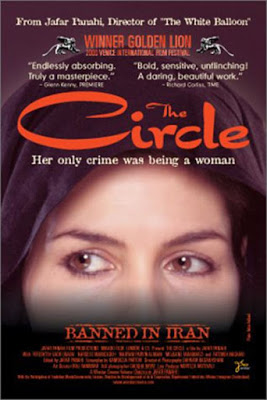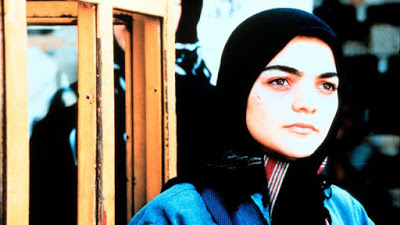After Jafar Panahi directed two wonderful
feel good films about children, he kicks us hard in the mouth with this one.
I wonder where it came from. Somewhere deep inside needing to crawl out and
see daylight. It is powerful, painful and a gut check to our conscious. It
is also obvious from the first few minutes that this film was going to get
Panahi in a lot of trouble and certainly be banned. It is like he is asking
for trouble - sticking his middle finger at the religious authorities - but
he felt he had to tell this tale no matter what. It is his I Accuse You moment.
This is why he makes films. He decides to go on full attack about the way
in which women are mistreated in Iran - sometimes so subtly that it almost
slips by you but at other times he hits us with a bat across the head. The
picture he paints of just the everyday repression, the constraints, the invasion
of privacy, the invisible status of women is searing and yet accepted by
society. There is no joy to be had here - just a freeway pile-up of sad stories.
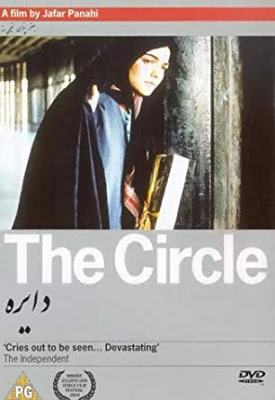
Panahi wants to give us a stream of different stories and does so in an ingenious
manner. He invites is into a tale and as we get involved he passes the story
to another woman like a baton in a relay race. And after these women who
have passed on their woe to another they disappear from the film, never to
reappear and we never to find out their fate. Perhaps that is for the best
because it isn't likely to be a happy one. The first scene is a sock in the
jaw that floored me - it begins with a long female scream- a baby is born
to the world - but when the news is passed to the mother of the woman who
just gave birth that it is a girl, her life collapses. A girl? Are you sure?
We were told it would be a boy? She walks away in abject dejection - when
her daughter's husband's family finds out it is a girl he will divorce her
- bring shame on her - destroy her life.
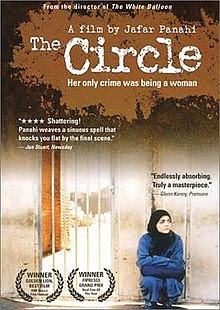
As she walks away from the hospital she goes by two women cowering behind
a car - hiding from the police - and the story is passed to them. And so
it goes from these two who are just out of jail - for what we are not exactly
sure but something of a sexual nature - maybe sleeping with a man before
marriage, maybe prostitution. They just want to leave town and start all
over again. It is never that easy. It later moves on to a woman who is pregnant
by a man who was executed and wants an abortion. Another is a woman who feels
she has no choice but to abandon her tiny daughter in hope that someone will
adopt it - absolutely wrenching. And finally just a prostitute who lands
in a cell which she is clearly familiar with - and there the film ends as
it pans the women in this holding cell as if to symbolize that all women
in Iran are in some sort of prison, marginalized and denied.
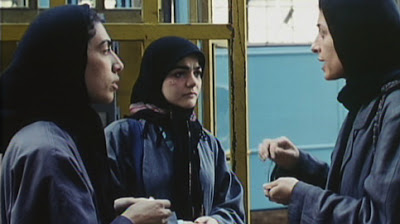
Each of the stories is filled with the little slights of life to women -
not being allowed to buy a bus ticket without a companion, being stopped
by the police to ask why they are on their own, men catcalling after them,
no smoking in public, being deserted by your family for a mistake that shamed
them - no forgiveness - and so on. It is every day coercion and repression
- follow the rules to the T or else. As in his first two films, Panahi shoots
much this on the streets of Tehran amid the parade of humanity - bringing
small details that add so much to the film - a man selling orange Fanta,
three old musicians playing their ancient instruments as they walk down the
sidewalk, a man hurriedly delivering tea on a tray - it is these small details
which I assume are happenstance that make his films feel so authentic. Most
of the men in the film are fine - though their roles are small - some helpful,
some not - this is no real condemnation of them but more of the patriarchal
society that is juiced up by a medieval powerful religious theocracy.
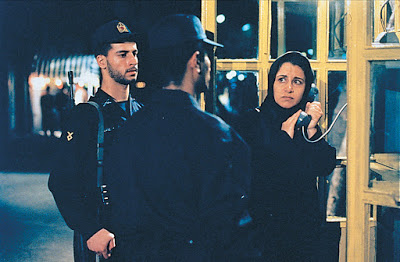
With this film I have now seen seven of the nine features that Jafar Panahi
has directed. I have not been able to get my hands on the other two. I have
been wanting to get through his films for a while now and am glad I finally
had the discipline to do so. Hard for me to stick to one thing for any period
of time. There are a number of directors whose work I have been wanting to
dig through but with only 9 films, Panahi seemed like a good place to start.
His films are great - a peek inside another culture filled with both humanity
and criticism. His life is film. He has been willing to go to jail just to
make film, to say what he feels he has to say - to put up a mirror to his
society. I just hope he stays out of prison but one feels that even if inside
he will figure out a way to direct a film and smuggle it out to Cannes!
